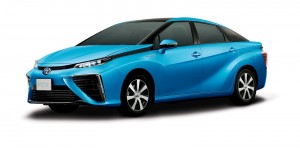The race for zero emission vehicles has largely been between hydrogen fuel cell technology and batteries. Many analysts feel there really isn’t a competition, given the superiority of batteries for both environmental and economic impacts. A new study from Stanford underscores this reality:
The results were definitive.
“In terms of overall costs, we found that battery electric vehicles are better than fuel cell vehicles for reducing emissions,” Felgenhauer said. “The analysis showed that to be cost competitive, fuel cell vehicles would have to be priced much lower than battery vehicles. However, fuel cell vehicles are likely to be significantly more expensive than battery vehicles for the foreseeable future. Another supposed benefit of hydrogen – storing surplus solar energy – didn’t pan out in our analysis either. We found that in 2035, only a small amount of solar hydrogen storage would be used for heating and lighting buildings.”
Perhaps more significantly, Toyota — one of the few automakers that has gone all-in on hydrogen — appears to be retrenching in favor of batteries, according to Elektrek:
Now one of the most prominent proponents of hydrogen fuel cell cars, Toyota, is reportedly planning to mass produce battery-powered long-range electric cars by 2020.
The news comes as Toyota is having difficulties selling the Mirai, its hydrogen cars, in the US. Despite cutting the price on several occasions, with now a lease at only $350 (down from $500) in California, the Japanese automaker can’t find a market for the vehicle and only delivered 782 units since it started deliveries last year – and that’s including the state buying dozens of them for their own fleets to justify the millions of dollars spent on refuelling infrastructure.
And as Nikkei reports:
Eyeing a full-scale entry into the electric vehicle market, the Japanese automaker will create an in-house team for planning and development as soon as the new year. Toyota will seek cooperation from group companies to start production quickly.
Toyota aims to develop an EV that can run more than 300km on a single charge. The platform for models such as the Prius hybrid or Corolla sedan is being considered for use in building an electric sport utility vehicle.
This is definitely significant news, particularly given that it seems to be in response to stagnant fuel cell vehicle sales. Of course, we shouldn’t pit technologies like these against each other, as hydrogen could potentially have a role for zero-emission transportation like long-haul trucking that is less suited for batteries. But it’s also not great to spend a lot of public dollars on hydrogen fueling infrastructure that won’t be needed. Maybe this latest development signals a new future for investments in EVs, without the distraction of fuel cells.
One thought on “Hydrogen Fuel Cell Vehicles Giving Way To Batteries? Toyota Changes Gears”
-
Pingback: Oil Industry Leaders Underestimate Electric Vehicles At Their Peril | Ethan Elkind
Leave a Reply
You must be logged in to post a comment.



